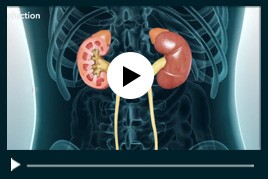Adrenal Condition
Adrenal glands are small glands which are triangular in shape and located on top of each kidney. These glands consist of two parts: the adrenal cortex (outer region) and the adrenal medulla (inner region). The function of the adrenal glands is to produce hormones including cortisol (responds to stress and helps regulate blood sugar, blood pressure (BP), immunity, metabolism, bone and nervous system), aldosterone (regulates sodium and potassium levels and helps to maintain blood pressure and water balance in the body), and sex hormones. Adrenal disorders can occur when the adrenal glands produce either excessive or insufficient amounts of adrenal hormones.
The most common adrenal gland disorders include:
- Adrenal Cancer: The cancer involves the adrenal cortex (outer portion of the adrenal gland). The associated symptoms include weight loss, abdominal pain, high blood pressure, high blood sugar levels, and irregular periods in women. Surgery to remove the cancer cells is the best treatment option recommended.
- Addison’s disease: Also termed adrenal insufficiency, it is caused due to under production of cortisol hormones by the adrenal glands. This condition can be life-threatening and affects both sexes at any age. Addison’s disease results from damage to the adrenal cortex due to an autoimmune condition (an individual’s immune system uses its own antibodies to destroy the adrenal glands). The symptoms associated with this condition include nausea, lack of appetite, constipation, diarrhoea, weakness, fatigue, craving salty food, and muscle and joint pain. Adrenal insufficiency can be treated by replacing the insufficient hormones with medications.
- Cushing’s disease: Adrenal glands normally produce a sufficient amount of cortisol hormones in response to stress. Cushing’ disease is caused by the excessive production of the cortisol hormones. This over production may also be a side effect of an over dose of steroids consumed by an individual to treat other problems. The symptoms include easy bruising, poor wound healing, weight gain and fat distribution in abnormal regions, tiredness, irritability, anxiety and mood swings. The treatment varies depending on the cause of the disease and includes surgery, radiation therapy, and use of medications to reduce the production of cortisol.
- Pheochromocytoma is a benign (non-cancerous) tumour that forms in the adrenal medulla (inner portion of the adrenal gland) which can cause excess production of hormones known as catecholamines (epinephrine and nonepinephrine). These hormones help in regulating blood pressure. The symptoms include high blood pressure, heart palpitations, headache, sweating, weight loss, and shortness of breath. The preferred treatment is the surgical removal of the tumour, usually performed through laparoscopic (minimally invasive) technique.
- Conn’s Syndrome is excessive production of mineralocorticoids (aldosterone) by the adrenal glands. This condition is characterized by headaches, high blood pressure, frequent urination, thirst, and muscle cramps. Treatment includes surgical removal of the diseased adrenal gland, known as adrenalectomy.
For further information on adrenal conditions, please contact Confident healthcare.

 Menu
Menu




